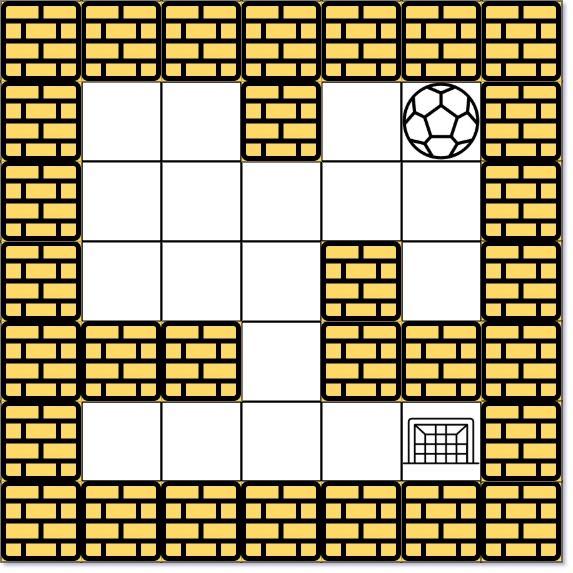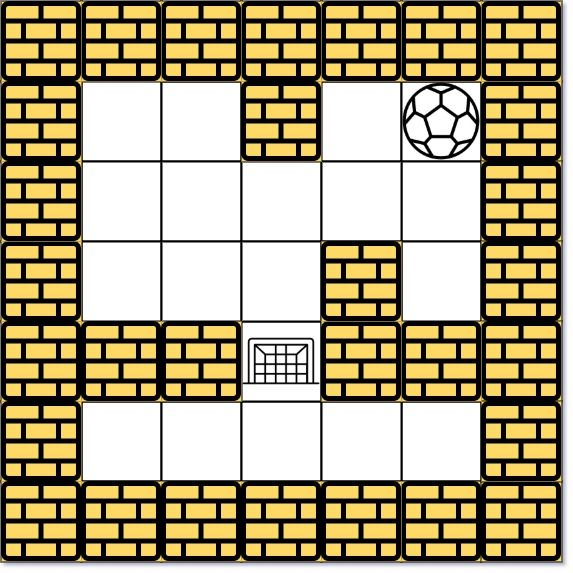由空地(用 0 表示)和墙(用 1 表示)组成的迷宫 maze 中有一个球。球可以途经空地向 上、下、左、右 四个方向滚动,且在遇到墙壁前不会停止滚动。当球停下时,可以选择向下一个方向滚动。
给你一个大小为 m x n 的迷宫 maze ,以及球的初始位置 start 和目的地 destination ,其中 start = [startrow, startcol] 且 destination = [destinationrow, destinationcol] 。请你判断球能否在目的地停下:如果可以,返回 true ;否则,返回 false 。
你可以 假定迷宫的边缘都是墙壁(参考示例)。
示例 1:

输入:maze = [[0,0,1,0,0],[0,0,0,0,0],[0,0,0,1,0],[1,1,0,1,1],[0,0,0,0,0]], start = [0,4], destination = [4,4] 输出:true 解释:一种可能的路径是 : 左 -> 下 -> 左 -> 下 -> 右 -> 下 -> 右。
示例 2:

输入:maze = [[0,0,1,0,0],[0,0,0,0,0],[0,0,0,1,0],[1,1,0,1,1],[0,0,0,0,0]], start = [0,4], destination = [3,2] 输出:false 解释:不存在能够使球停在目的地的路径。注意,球可以经过目的地,但无法在那里停驻。
示例 3:
输入:maze = [[0,0,0,0,0],[1,1,0,0,1],[0,0,0,0,0],[0,1,0,0,1],[0,1,0,0,0]], start = [4,3], destination = [0,1] 输出:false
提示:
m == maze.lengthn == maze[i].length1 <= m, n <= 100maze[i][j]is0or1.start.length == 2destination.length == 20 <= startrow, destinationrow <= m0 <= startcol, destinationcol <= n- 球和目的地都在空地上,且初始时它们不在同一位置
- 迷宫 至少包括 2 块空地
深度优先搜索或广度优先搜索实现。
深度优先搜索。
class Solution:
def hasPath(self, maze: List[List[int]], start: List[int], destination: List[int]) -> bool:
def dfs(maze, start, destination):
if visited[start[0]][start[1]]:
return False
if start[0] == destination[0] and start[1] == destination[1]:
return True
visited[start[0]][start[1]] = True
l, r, u, d = start[1] - 1, start[1] + 1, start[0] - 1, start[0] + 1
while l >= 0 and maze[start[0]][l] == 0:
l -= 1
if dfs(maze, [start[0], l + 1], destination):
return True
while r < len(maze[0]) and maze[start[0]][r] == 0:
r += 1
if dfs(maze, [start[0], r - 1], destination):
return True
while u >= 0 and maze[u][start[1]] == 0:
u -= 1
if dfs(maze, [u + 1, start[1]], destination):
return True
while d < len(maze) and maze[d][start[1]] == 0:
d += 1
if dfs(maze, [d - 1, start[1]], destination):
return True
return False
visited = [[False for _ in maze[0]] for _ in maze]
return dfs(maze, start, destination)class Solution {
private boolean[][] visited;
public boolean hasPath(int[][] maze, int[] start, int[] destination) {
int m = maze.length, n = maze[0].length;
visited = new boolean[m][n];
return dfs(maze, start, destination);
}
private boolean dfs(int[][] maze, int[] start, int[] destination) {
if (visited[start[0]][start[1]]) return false;
if (start[0] == destination[0] && start[1] == destination[1]) return true;
visited[start[0]][start[1]] = true;
int l = start[1] - 1, r = start[1] + 1, u = start[0] - 1, d = start[0] + 1;
while (l >= 0 && maze[start[0]][l] == 0) --l;
if (dfs(maze, new int[]{start[0], l + 1}, destination)) return true;
while (r < maze[0].length && maze[start[0]][r] == 0) ++r;
if (dfs(maze, new int[]{start[0], r - 1}, destination)) return true;
while (u >= 0 && maze[u][start[1]] == 0) --u;
if (dfs(maze, new int[]{u + 1, start[1]}, destination)) return true;
while (d < maze.length && maze[d][start[1]] == 0) ++d;
if (dfs(maze, new int[]{d - 1, start[1]}, destination)) return true;
return false;
}
}